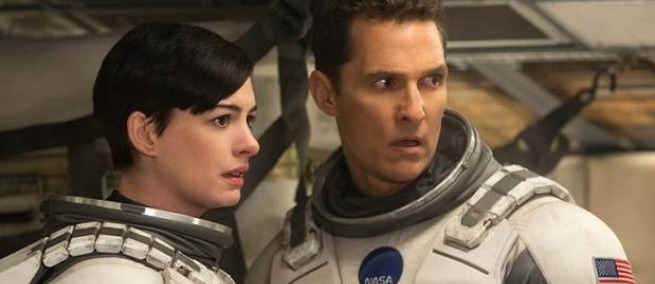
Every genre has its rules, which can and should be broken but which in the breaking must at least be acknowledged and respected. Science fiction in particular has a lot of rules—ordinarily referred to as the laws of physics, mathematics, chemistry and biology—and these rules, too, are often mutilated for larger thematic purposes. But it's often the measure of a movie in how, why and with what respect the rules are dashed and circumvented. If you're making, say, Fire Maidens of Outer Space (1956), it's clear you have already, from the exquisite title on down, stepped past the most basic idea of scientific reason and toward the nutty poetry of metaphor and/or pulp. Good for you. But if your movie is explicitly and primarily about cutting-edge science—if the entirety of your film's thematic and textual stuff depends upon the rules and how they impact with human nature, as Christopher Nolan's Interstellar does—then the wiggle room you have for "poetic license" is skin-tight, and you toy with science at your peril.
No matter how dazzling the CGIs, such a movie will collapse into nonsense before our eyes and this is essentially what happens to Interstellar, though when exactly the bogus science begins to erode the film's credibility may vary with each viewer. For me, it was midway through, during what was ironically the film's strongest scene—when, after passing blindly through a wormhole into another galaxy, Matthew McConaughey and Anne Hathaway return from the planet on the rim of a black hole, to find their shipmate (David Oyelowo) having aged more than 20 years in the process, which seems, by the way, a reasonable dramatization of the paradoxes of time-space relativity. Later, though, McConaughey's hot dog sits down and watches an emotional video message from his daughter (Jessica Chastain), who has now suddenly grow to be as old as he is, an ironic-tragic result that the script had already warned us about. What we weren't briefed on is how we're supposed to just buy that video signals from Earth, in one galaxy, are somehow making it to the astronaut's ship, in another, with little time lost. The closest galaxy is Andromeda, which is two and a half million light years away. Whatever transmission technology this devastated Earth of the near-future has come up with, it can't beat light, and so these signals would've taken at least 2.5 million years to reach their point of reception. That is, if somehow the equipment on Earth knew exactly where the wormhole had spat out the exploring ship…
Nit-picking? What would Carl Sagan say? This isn't poetic license, it's a short cut, deliberate ignorance about a basic fact of celestial reality even non-nerds like me are aware of. A grade-schooler's bullshit meter should hit the red. With this dramatically convenient cheat, suddenly the movie's robust sense of self-grandeur and pretension melts into a dull goo. But wait—our disappointment hardens into rage during the film's climactic third act, as ridiculously unsound ideas are tossed at us like so many overripe tomatoes.
Spoilers: men pass through black holes; five-dimensional tesseract worlds are suddenly and mysteriously mustered from memories (I think); an unconscious astronaut drifting solo in the zillion-square-miles of space around Saturn is luckily rescued by a passing ship, before freezing or suffocating to death. McConaughey communicates a math formula across dimensional borders to his grown daughter (but not to us), to save a starving mankind, except the result, it seems, is a merely giant centrifuge space station built approximately 50 years later (sure) near Saturn (why? who knows?), which looks as though it could comfortably accommodate a few hundred people, not the entire human race. In the very end, McConaughey decides to leave the ersatz neo-Earth (after spending all of three minutes with his dying, now-elderly daughter, played by Ellen Burstyn), and go find Anne Hathaway through the wormhole, both he and Nolan forgetting that, given relativity, she will be either decrepit or dead by the time he gets there.
Theoretical physicist Kip Thorne gained some notoriety as the well-paid consultant on Interstellar and despite the fact that he has publicly said that Nolan ignored some of his advice in the name of "poetic license," he should remain ashamed of himself. More money has been spent on far less ambition, but for a film that cost about what it takes to launch an actual middling research satellite into orbit ($165 million), Interstellar could've benefitted from some real science-fiction conceptualizing and writing. Nolan, among a great many big names in Hollywood, routinely churns out huge-budgeted but thought-depleted movies as though a legacy of fine-tuned, expertly explored, idea-rich sci-fi lit didn't proceed them, and remains out there, largely ignored and unadapted.
Simply going to the masters of the genre would solve the problem; a cursory rummage through the oeuvres of, say, Poul Anderson, Robert Heinlein, Robert Silverberg, Roger Zelazny, Theodore Sturgeon, C.M. Kornbluth, A.E. van Vogt and Lester del Rey, however dated in their scientific particulars, would correct this laziness and provide an archive's worth of fecund ideas about how science and narrative and human folly can intertwine, resonate and make sense all the way to the end. The back catalogue of Philip K. Dick has seen a lot of action, but his contemporaries and forbears have been woefully neglected. Instead, amateur conceptualists like Nolan (and Wally Pfister, J.J. Abrams, Neill Blomkamp, not to mention a small army of YA dystopians, and whatever whelps are hired to write the new Planet of the Apes reboots and the last few Tom Cruise movies) presume that we can't tell or couldn't care that their films don't make a lick of elementary sense. Economically, I suppose, they're right: the films they've made are nearly always box-office behemoths, a result largely of pure visual sensation and marketing force. But the culture sickens when viewers—and in this case a good number of film critics—aren’t paying attention enough to notice.